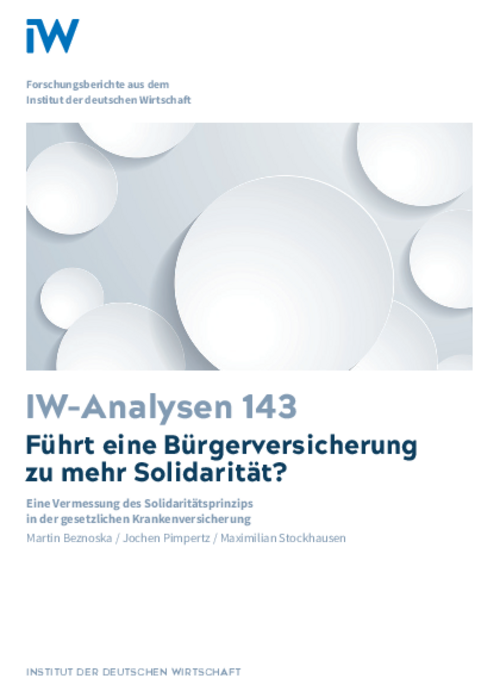The principle behind Germany’s statutory health insurance (SHI) system, into which all employees up to a certain income threshold are obliged to pay a per¬centage of their earnings, is one of solidarity.

Would universal health insurance lead to more solidarity?: Measuring the solidarity principle in Germany’s statutory health insurance system

The principle behind Germany’s statutory health insurance (SHI) system, into which all employees up to a certain income threshold are obliged to pay a per¬centage of their earnings, is one of solidarity.
Currently about four out of ten statutorily insured persons make a solidarity contribution by paying in more than the average benefits accruing to those of their age and gender. The remaining sixty percent of SHI members contribute correspondingly less. In total, just under 37 percent of SHI expenditure is financed by this solidarity-based redistribution. The universal insurance scheme currently under discussion (commonly known as a Bürgerversicherung or ‘citizens’ insurance’) aims to strengthen the principle of solidarity by drawing in those currently excluded and thus, according to its proponents, distribute the burden more “fairly”. If the SHI system as it is now applied were extended to the entire population, the contribution rate could be reduced by 0.8 to 1.0 percentage points, thus permanently relieving the burden on those already statutorily insured. However, changing demographics, progress in medical technology and misaligned incentives are continuing to push up health care expenditure well beyond the general cost of living. Given this, the SHI con¬tribution rate would return to its current level after only some six years – with an ongoing upward trend. Despite the change in the cross-sectional distribution of the burden, any increase in the solidarity effect would not be long sustained. In a universal insurance scheme the share of net contributors paying in at the re¬duced contribution rate would increase only slightly, and the proportion of SHI expenditure financed by redistribution would barely reach the level in the system as it is now. Moreover, with an ageing population, an overall balance in solidarity can only be achieved at the expense of intergenerational solidarity, as contribu¬tion rates rise and the younger cohorts shoulder ever higher solidarity burdens. This raises the question as to whether the solidarity principle is justified at all. By contrast, limiting benefit entitlements financed according to the SHI’s current pay-as-you-go system – and supplementing them with funded elements – would help to establish solidarity-based redistribution on an intergenerationally fair footing.

Would universal health insurance lead to more solidarity?: Measuring the solidarity principle in Germany’s statutory health insurance system

More on the topic

Challenges for the debt brake
In 2019, Bardt et al. (2019) initially presented a comprehensive estimate of the unmet public investment needs in Germany not covered in household planning at the time, totaling around €460 billion over ten years.
IW
Global and European corporate tax reform concepts
The harmonization of corporate taxation at an international level has been on the political agenda for many years. Both the Organization for Economic Cooperation and Development (OECD) and the European Commission have presented reform projects in this regard, ...
IW